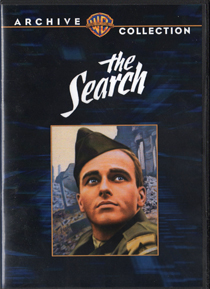Some topics are just more difficult than others to translate to the movies, and the Holocaust is one of them. Still, there have been countless attempts in both film, television, and miniseries since the end of WWII, many of them very good. Almost always there's a message of hope, but these are not easy movies to watch. Of all the millions killed though, what about the millions more who survived somehow and were scarred the rest of their lives? What about the collateral damage of the war? How did Europe survive? Released just three years after the end of World War II, 1948's The Search is one of the best movies I've ever seen documenting a post-war reconstruction, both on the cities and countries, but on those people -- especially the kids -- who survived the ordeal.
World War II has ended, and the reconstruction of Europe has begun. Concentration camps have been liberated meaning countless thousands and millions of people now have to be dealt with, among them thousands of orphaned children. One little boy, Karel Malik (Ivan Jandl), is a survivor of Auschwitz and is now mute because his mind has regressed in a way to protect itself. Karel runs away from the American Red Cross workers trying to help him, eventually meeting American soldier/engineer, Ralph Stevenson (Montgomery Clift). Not sure what to do with the boy, the soldier takes him in, trying to rehabilitate him, get him used to the world again. They bond quickly, the American soldier even hoping to bring him home to America. But all the while -- unknown to them -- Karel's mother (also a survivor of the death camps), Hannah (Jarmila Novotna) is searching displaced children's camps one by one, desperately searching for her son.
With all the stories of soldiers in combat, large-scale conflicts where millions of lives were lost, the effect of war on the civilians can so often be left behind. Seeing that effect on one little boy who's not even 10-years old provides one of the more moving war stories I've ever seen. Director Fred Zinnemann shows a post-war Europe, the ruined cities, the empty streets, the squalor in the conditions, the desperate fight for survival from day-to-day. It's hard to fathom it all, that kids who should have been in grammar school were forced to live like that.
In an age where it seems every child actor ever has no real acting ability and just hams it up, seeing little Jandl's performance is remarkable. He was honored with an Academy Award as a juvenile for his part. His life story following the movie is tragic because the Czech government saw how much hope he gave to audiences, and basically imprisoned this little boy for the rest of his life. But on this performance alone, it's one of the best I've ever seen given by a child actor (he was 12 at the time). His eyes are so expressive, you see the pain, the pure terror in them, the atrocities he had to see. Getting a second chance to see the world isn't always an awful place, he opens up to Clift's Steve character, becoming healthy again, first learning to speak again, and then learning to speak English word by word.
In just his second feature film, Clift shows his remarkable talent as well. This is a part that in the wrong hands wouldn't have worked because it would be easy to overshadow the Karel role. Clift never goes that far. His part is quiet, easy-going, and caring as he tries to help this boy however he can. There was potential here to get sappy, to go down the road of blatant propaganda, the American savior swooping in and making everything right. It never goes that way thankfully. Clift is interested in helping this one boy, meeting him one day on the streets and offering him a second sandwich he brought along for lunch. There's an ebb and flow to it all, seeing how much the boy can handle and in what way to do it. In a career shortened by his death at the age of 45, this is one of his best.
So separately these two performances could carry a movie on their own, and combining them? Well, you've got a real winner. The early going in the movie takes a little time to get moving as everything falls into place. Once Karel -- Jimmy as Steve names him -- and Steve meet, the pace quickens. Scenes of him trying to get Jimmy to speak (starting with just 'yes' and 'no') are heartbreaking in their effectiveness, tugging at your heart strings like there's no tomorrow. It just gets worse/better (depending on how you look at) as Jimmy learns English one word at a time with some help from Steve and fellow soldier Jerry Fisher (Wendell Corey). The performances from Novotna as Karel/Jimmy's mother is equally moving, one woman desperately searching for her son, and Aline MacMahon as Mrs. Murray, a Red Cross worker trying to help thousands of people, fill out the supporting cast.
Cynic that I am when it comes to most things, I started worrying about the end of the story pretty soon after Steve meets little Karel. It has to have a happy ending, this perfect little story, doesn't it? The tone early on shows that the story isn't afraid to pull punches so I wondered if it would be a satisfying ending. Thankfully, my concerns were unfounded. In one of those endings that has you worried these characters are going to miss each other by the slimmest of seconds, everything fits together. I'm not talking a tear in your eyes, I'm talking streaming down your face. Moving, powerful, and gut-wrenching all at once, this was a great movie, and one that all moviegoers should get a chance to see.
The Search <---trailer (1948): ****/****


No comments:
Post a Comment